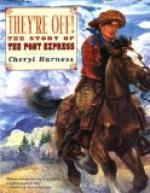Another class of men to be feared was a small but powerful group representing much wealth, a financial class which proverbially shuns war because of the expense which war involves; a class that always insists upon peace, even at the cost of compromised honor. These men, with the influence which their money commanded, would inevitably espouse the side that seemed the most likely of speedy success; and in view of the early successes of the Confederate armies and the zealous proselytizing of rebel sympathizers in their midst they were a potential risk to loyal California.
The native Spanish or Mexican classes then numerically strong in that state, were appealed to by the anti-Unionists from various cunning approaches, chief of which was the theory that the many real estate troubles and complicated land titles by which they had been annoyed since the separation from Old Mexico in 1847, would be promptly adjusted under Confederate authority. While nearly all these natives were ignorant, many held considerable property and they in turn influenced their poorer brethren. Chimerical as this argument may sound, it had much weight.
Another group of persons also large potentially and a serious menace when proselyted by the apostles of rebellion, were the squatters and trespassers who were occupying land to which they had no lawful right. Many of these men were reckless; some had already been entangled in the courts because of their false land claims. Hence their attitude toward the existing Government was ugly and defiant. Yet they were now assured that they might remain on their lands forever undisturbed, under a rebel régime.
Added to all these sources of danger was the attitude of the thousands of well-meaning people — who, regardless of rebel solicitation, were at first indifferent. They thought that the great distance which separated them from the seat of war made it a matter of but little importance whether California aroused herself or not. They were of course counseling neutrality as the easiest way of avoiding trouble.
Turning now to the forces, moral, military, and political, that were working to save California — first there was a loyal newspaper press, which saw and followed its duty with unflinching devotion. It firmly held before the people the loyal responsibility of the state and declared that the ties of union were too sacred to be broken. It was the moral duty of the people to remain loyal. It truthfully asserted that California’s influence in the Federal Union should be an example for other states to follow. If the idea of a Pacific Republic were repudiated by their own citizens, such action would discourage secession elsewhere and be a great moral handicap to that movement. And the press further pointed out with convincing clearness, that should the Union be dissolved, the project for a Pacific Railroad[19] with which the future of the Commonwealth was inevitably committed, would likely fail.




